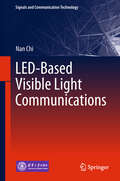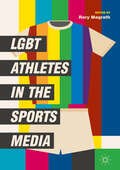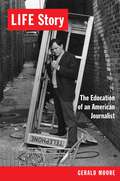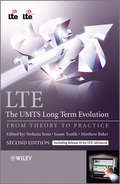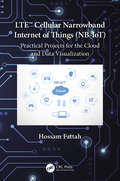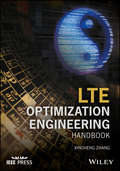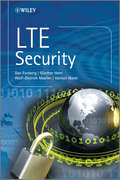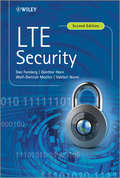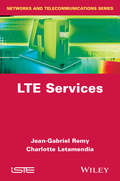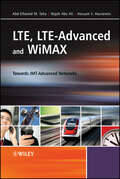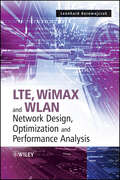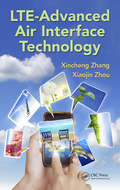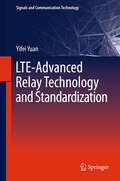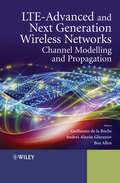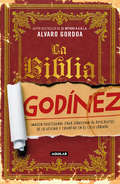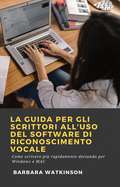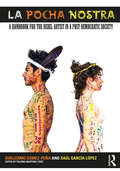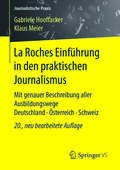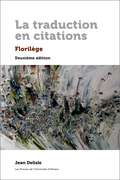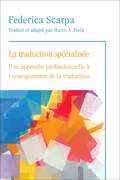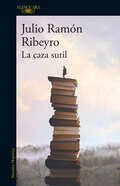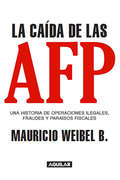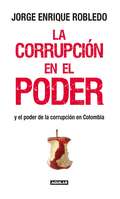- Table View
- List View
LED-Based Visible Light Communications (Signals and Communication Technology)
by Nan ChiThe book systematically introduces the visible light communication (VLC) technology in detail. Basic concepts and how to realize the system are both illustrated, including the transmitter, channel, and the receiver. In addition, a good many experimental results are presented to help readers further understand the VLC technologies. The upper-layer protocols of visible light communication system and the technology trends are also discussed. This book can be a good reference work for researchers, engineers, and graduate students in the fields of communications, LED, and optics.
LGBT Athletes in the Sports Media
by Rory MagrathIn recent years, lesbian, gay, bisexual, and transgender (LGBT) athletes have received more media attention than ever before. Declining levels of homophobia across the Western world has facilitated a greater acceptance of LGBT athletes among heterosexual teammates, fans, and the sports media. Consequently, academic interest in sport, gender and sexuality has also increased substantially. This edited collection combines studies of gender and sexuality with that of the sports media to provide the first-ever comprehensive academic overview of LGBT athletes in the sports media. It draws upon work from a wide range of international scholars to provide an interdisciplinary analysis of improved media coverage of LGBT athletes, as well as the numerous issues and barriers which continue to exist. LGBT Athletes in the Sports Media will be of interest to students and scholars across a range of disciplines, including sociology, media studies, and gender studies.
LIFE Story: The Education of an American Journalist
by Gerald MooreBefore Americans got their news from television, they got it from LIFE, the weekly magazine that set the standard for photojournalism. In LIFE Story Gerald Moore—a writer and editor who worked at the magazine in the last glory years before TV made it obsolete—recalls the dizzying excitement and glamour of LIFE&’s fast-moving, powerful approach to spreading the news. Moore covered the major stories of the late 1960s and early 1970s: LSD, assassinations, the 1968 Democratic convention in Chicago, the McCarthy campaign, urban riots, the My Lai massacre, and the beginnings of feminism. Before joining LIFE at the age of twenty-seven, he worked as a police officer in Albuquerque and then a reporter at the Albuquerque Tribune—both jobs teaching him the tools of his trade. His story offers a wonderful look back at the good and the bad old days of journalism.
LTE - The UMTS Long Term Evolution
by Stefania Sesia Issam Toufik Matthew Baker"Where this book is exceptional is that the reader will not just learn how LTE works but why it works"Adrian Scrase, ETSI Vice-President, International Partnership ProjectsFollowing on the success of the first edition, this book is fully updated, covering the latest additions to LTE and the key features of LTE-Advanced.This book builds on the success of its predecessor, offering the same comprehensive system-level understanding built on explanations of the underlying theory, now expanded to include complete coverage of Release 9 and the developing specifications for LTE-Advanced. The book is a collaborative effort of more than 40 key experts representing over 20 companies actively participating in the development of LTE, as well as academia. The book highlights practical implications, illustrates the expected performance, and draws comparisons with the well-known WCDMA/HSPA standards. The authors not only pay special attention to the physical layer, giving an insight into the fundamental concepts of OFDMA-FDMA and MIMO, but also cover the higher protocol layers and system architecture to enable the reader to gain an overall understanding of the system.Key New Features:Comprehensively updated with the latest changes of the LTE Release 8 specifications, including improved coverage of Radio Resource Management RF aspects and performance requirementsProvides detailed coverage of the new LTE Release 9 features, including: eMBMS, dual-layer beamforming, user equipment positioning, home eNodeBs / femtocells and pico cells and self-optimizing networksEvaluates the LTE system performanceIntroduces LTE-Advanced, explaining its context and motivation, as well as the key new features including: carrier aggregation, relaying, high-order MIMO, and Cooperative Multi-Point transmission (CoMP).Includes an accompanying website containing a complete list of acronyms related to LTE and LTE-Advanced, with a brief description of each (http://www.wiley.com/go/sesia_theumts)This book is an invaluable reference for all research and development engineers involved in implementation of LTE or LTE-Advanced, as well as graduate and PhD students in wireless communications. Network operators, service providers and R&D managers will also find this book insightful.
LTE Cellular Narrowband Internet of Things (NB-IoT): Practical Projects for the Cloud and Data Visualization
by Hossam FattahNB-IoT is the Internet of Things (IoT) technology used for cellular communication. NB-IoT devices deliver much better capability and performance, such as: increased area coverage of up to one kilometer; a massive number of devices—up to 200,000—per a single base-station area; longer battery lifetime of ten years; and better indoor and outdoor coverage for areas with weak signal, such as underground garages. The cellular NB-IoT technology is a challenging technology to use and understand. With more than 30 projects presented in this book, covering many use cases and scenarios, this book provides hands-on and practical experience of how to use the cellular NB-IoT for smart applications using Arduino™, Amazon Cloud, Google Maps, and charts. The book starts by explaining AT commands used to configure the NB-IoT modem; data serialization and deserialization; how to set up the cloud for connecting NB-IoT devices; setting up rules, policy, security certificates, and a NoSQL database on the cloud; how to store and read data in the cloud; how to use Google Maps to visualize NB-IoT device geo-location; and how to use charts to visualize sensor datasets. Projects for Arduino are presented in four parts. The first part explains how to connect the device to the mobile operator and cellular network; perform communication using different network protocols, such as TCP, HTTP, SSL, or MQTT; how to use GPS for geo-location applications; and how to upgrade NB-IoT modem firmware over the air. The second part explains the microcontroller unit and how to build and run projects, such as a 7-segment display or a real-time clock. The third part explains how NB-IoT can be used with sensor devices, such as ultrasonic and environmental sensors. Finally, the fourth part explains how NB-IoT can be used to control actuators, such as stepper motors and relays. This book is a unique resource for understanding practical uses of the NB-IoT technology and serves as a handbook for technical and non-technical readers who are looking for practicing and exercising the cellular NB-IoT technology. The book can be used by engineers, students, researchers, system integrators, mobile operators’ technical staff, and electronics enthusiasts. To download the software which can be used with the book, go to: https://github.com/5ghub/NB-IoT About the Author: Hossam Fattah is a technology expert in 4G/5G wireless systems and networking. He received his Ph.D. in Electrical and Computer Engineering from University of British Columbia, Vancouver, Canada in 2003. He received his Master of Applied Science in Electrical and Computer Engineering from University of Victoria, Victoria, Canada in 2000. He completed his B.Sc. degree in Computers and Systems Engineering from Al-Azhar University, Cairo, Egypt in 1995. Between 2003 and 2011, he was in academia and industry, including Texas A&M University. Between 2011 and 2013, he was with Spirent Communications, NJ, USA. Since 2013, he has been with Microsoft, USA. He is also an affiliate associate professor at University of Washington, Tacoma, WA, USA, teaching graduate courses on IoT and distributed systems and collaborating on 5G research and innovations. He has had many patents and technical publications in conferences and journals. He is a registered professional Engineer with the Association of Professional Engineers, British Columbia, Canada. He is the author of the recent book 5G LTE Narrowband Internet of Things (NB-IoT). His research interest is in wireless communications and radio networks and protocols, cellular quality of service, radio resource management, traffic and packet scheduling, network analytics, and mobility.
LTE Optimization Engineering Handbook
by Xincheng ZhangA comprehensive resource containing the operating principles and key insights of LTE networks performance optimization LTE Optimization Engineering Handbook is a comprehensive reference that describes the most current technologies and optimization principles for LTE networks. The text offers an introduction to the basics of LTE architecture, services and technologies and includes details on the key principles and methods of LTE optimization and its parameters. In addition, the author clarifies different optimization aspects such as wireless channel optimization, data optimization, CSFB, VoLTE, and video optimization. With the ubiquitous usage and increased development of mobile networks and smart devices, LTE is the 4G network that will be the only mainstream technology in the current mobile communication system and in the near future. Designed for use by researchers, engineers and operators working in the field of mobile communications and written by a noted engineer and experienced researcher, the LTE Optimization Engineering Handbook provides an essential guide that: Discusses the latest optimization engineering technologies of LTE networks and explores their implementation Features the latest and most industrially relevant applications, such as VoLTE and HetNets Includes a wealth of detailed scenarios and optimization real-world case studies Professionals in the field will find the LTE Optimization Engineering Handbook to be their go-to reference that includes a thorough and complete examination of LTE networks, their operating principles, and the most current information to performance optimization.
LTE Security
by Wolf-Dietrich Moeller Dan Forsberg Valtteri Niemi Günther HornA concise, updated guide to the 3GPP LTE Security Standardization specificationsA welcome Revised Edition of the successful LTE Security addressing the security architecture for SAE/LTE, which is based on elements of the security architectures for GSM and 3G, but which needed a major redesign due to the significantly increased complexity, and different architectural and business requirements of fourth generation systems. The authors explain in detail the security mechanisms employed to meet these requirements. The specifications generated by standardization bodies only inform about how to implement the system (and this only to the extent required for interoperability), but almost never inform readers about why things are done the way they are. Furthermore, specifications tend to be readable only for a small group of experts and lack the context of the broader picture. The book fills this gap by providing first hand information from insiders who participated in decisively shaping SAE/LTE security in the relevant standardization body, 3GPP, and can therefore explain the rationale for design decisions in this area.A concise, fully updated guide to the 3GPP LTE Security Standardization specificationsDescribes the essential elements of LTE and SAE Security, written by leading experts who participated in decisively shaping SAE/LTE security in the relevant standardization body, 3GPPExplains the rationale behind the standards specifications giving readers a broader understanding of the context to these specificationsIncludes new chapters covering 3GPP work on system enhancements for MTC, plus application layer security in ETSI TC M2M and embedded smart card in ETSI SCP; Security for Machine-type Communication, Relay Node Security, and Future Challenges, including Voice over LTE, MTC, Home base stations, LIPA/SIPTO, and New Cryptographic AlgorithmsEssential reading for System engineers, developers and people in technical sales working in the area of LTE and LTE security, communication engineers and software developers in mobile communication field.
LTE Security (NSN/Nokia Series #1)
by Wolf-Dietrich Moeller Dan Forsberg Valtteri Niemi Günther HornA concise, updated guide to the 3GPP LTE Security Standardization specifications A welcome Revised Edition of the successful LTE Security addressing the security architecture for SAE/LTE, which is based on elements of the security architectures for GSM and 3G, but which needed a major redesign due to the significantly increased complexity, and different architectural and business requirements of fourth generation systems. The authors explain in detail the security mechanisms employed to meet these requirements. The specifications generated by standardization bodies only inform about how to implement the system (and this only to the extent required for interoperability), but almost never inform readers about why things are done the way they are. Furthermore, specifications tend to be readable only for a small group of experts and lack the context of the broader picture. The book fills this gap by providing first hand information from insiders who participated in decisively shaping SAE/LTE security in the relevant standardization body, 3GPP, and can therefore explain the rationale for design decisions in this area. A concise, fully updated guide to the 3GPP LTE Security Standardization specifications Describes the essential elements of LTE and SAE Security, written by leading experts who participated in decisively shaping SAE/LTE security in the relevant standardization body, 3GPP Explains the rationale behind the standards specifications giving readers a broader understanding of the context to these specifications Includes new chapters covering 3GPP work on system enhancements for MTC, plus application layer security in ETSI TC M2M and embedded smart card in ETSI SCP; Security for Machine-type Communication, Relay Node Security, and Future Challenges, including Voice over LTE, MTC, Home base stations, LIPA/SIPTO, and New Cryptographic Algorithms Essential reading for System engineers, developers and people in technical sales working in the area of LTE and LTE security, communication engineers and software developers in mobile communication field.
LTE Security (Nsn/nokia Ser. #1)
by Wolf-Dietrich Moeller Dan Forsberg Valtteri Niemi Günther HornAddressing the security solutions for LTE, a cellular technology from Third Generation Partnership Project (3GPP), this book shows how LTE security substantially extends GSM and 3G security. It also encompasses the architectural aspects, known as SAE, to give a comprehensive resource on the topic. Although the security for SAE/LTE evolved from the security for GSM and 3G, due to different architectural and business requirements of fourth generation systems the SAE/LTE security architecture is substantially different from its predecessors. This book presents in detail the security mechanisms employed to meet these requirements. Whilst the industry standards inform how to implement systems, they do not provide readers with the underlying principles behind security specifications. LTE Security fills this gap by providing first hand information from 3GPP insiders who explain the rationale for design decisions. Key features: Provides a concise guide to the 3GPP/LTE Security Standardization specifications Authors are leading experts who participated in decisively shaping SAE/LTE security in the relevant standardization body, 3GPP Shows how GSM and 3G security was enhanced and extended to meet the requirements of fourth generation systems Gives the rationale behind the standards specifications enabling readers to have a broader understanding of the context of these specifications Explains why LTE security solutions are designed as they are and how theoretical security mechanisms can be put to practical use
LTE Services
by Jean-Gabriel Rémy Charlotte LetamendiaLTE (Long Term Evolution) is commonly marketed as 4G. LTE and LTE Advanced have been recognized by ITU-R and ITU-T (International Telecommunications Union - Telecommunications) as the principal solution for the future mobile communication networks standards. They are thus the framework of what the marketing calls 4G and possibly also 5G.This book describes various aspects of LTE as well as the change of paradigm, which it is bringing to mobile communications, focusing on LTE standards and architecture, OFDMA, the Full IP Core Network and LTE security.
LTE, LTE-Advanced and WiMAX
by Hossam S. Hassanein Abd-Elhamid M. Taha Najah Abu AliA concise introduction to IMT-Advanced Systems, including LTE-Advanced and WiMAXThere exists a strong demand for fully extending emerging Internet services, including collaborative applications and social networking, to the mobile and wireless domain. Delivering such services can be possible only through realizing broadband in the wireless. Two candidate technologies are currently competing in fulfilling the requirements for wireless broadband networks, WiMAX and LTE. At the moment, LTE and its future evolution LTE-Advanced are already gaining ground in terms of vendor and operator support. Whilst both technologies share certain attributes (utilizing Orthogonal Frequency Division Multiple Access (OFDMA) in downlink, accommodating smart antennas and full support for IP-switching, for example), they differ in others (including uplink technology, scheduling, frame structure and mobility support). Beyond technological merits, factors such as deployment readiness, ecosystem maturity and migration feasibility come to light when comparing the aptitude of the two technologies.LTE, LTE-Advanced and WiMAX: Towards IMT-Advanced Networks provides a concise, no-nonsense introduction to the two technologies, covering both interface and networking considerations. More critically, the book gives a multi-faceted comparison, carefully analyzing and distinguishing the characteristics of each technology and spanning both technical and economic merits. A "big picture" understanding of the market strategies and forecasts is also offered.Discusses and critically evaluates LTE, LTE-Advanced and WiMAX (Legacy and Advanced)Gives an overview of the principles and advances of each enabling technologyOffers a feature-by-feature comparison between the candidate technologiesIncludes information which appeals to both industry practitioners and academicsProvides an up-to-date report on market and industry status
LTE, WiMAX and WLAN Network Design, Optimization and Performance Analysis
by Leonhard KorowajczukA technological overview of LTE and WiMAX LTE, WiMAX and WLAN Network Design, Optimization and Performance Analysis provides a practical guide to LTE and WiMAX technologies introducing various tools and concepts used within. In addition, topics such as traffic modelling of IP-centric networks, RF propagation, fading, mobility, and indoor coverage are explored; new techniques which increase throughput such as MIMO and AAS technology are highlighted; and simulation, network design and performance analysis are also examined. Finally, in the latter part of the book Korowajczuk gives a step-by-step guide to network design, providing readers with the capability to build reliable and robust data networks. By focusing on LTE and WiMAX this book extends current network planning approaches to next generation wireless systems based on OFDMA, providing an essential resource for engineers and operators of fixed and wireless broadband data access networks. With information presented in a sequential format, LTE, WiMAX and WLAN Network Design, Optimization and Performance Analysis aids a progressive development of knowledge, complementing latter graduate and postgraduate courses while also providing a valuable resource to network designers, equipment vendors, reference material, operators, consultants, and regulators. Key Features: One of the first books to comprehensively explain and evaluate LTE Provides an unique explanation of the basic concepts involved in wireless broadband technologies and their applications in LTE, WiMAX, and WLAN before progressing to the network design Demonstrates the application of network planning for LTE and WiMAX with theoretical and practical approaches Includes all aspects of system design and optimization, such as dynamic traffic simulations, multi-layered traffic analysis, statistical interference analysis, and performance estimations
LTE-Advanced Air Interface Technology
by Xincheng Zhang Xiaojin ZhouOpportunities are at hand for professionals eager to learn and apply the latest theories and practices in air interface technologies. Written by experienced researchers and professionals, LTE-Advanced Air Interface Technology thoroughly covers the performance targets and technology components studied by 3GPP for LTE-Advanced. Besides being an expla
LTE-Advanced Relay Technology and Standardization
by Yifei YuanLTE-Advanced relay technology and standardization provides a timely reference work for relay technology with the finalizing of LTE Release 10 specifications. LTE-Advanced is quickly becoming the global standard for 4G cellular communications. The relay technology, as one of the key features in LTE-Advanced, helps not only to improve the system coverage and capacity, but also to save the costs of laying wireline backhaul. As a leading researcher in the field of LTE-Advanced standards, the author provides an in-depth description of LTE-A relay technology, and explains in detail the standard specification and design principles. Readers from both academic and industrial fields can find sections of interest to them: Sections 2 & 4 could benefit researchers in academia and those who are engaged in exploratory work, while Sections 3 & 4 are more useful to engineers. Dr. Yifei Yuan is the Technical Director at the Standards Department of ZTE Inc.
LTE-Advanced and Next Generation Wireless Networks
by Guillaume De La Roche Andres Alayon-Glazunov Ben AllenLTE- A and Next Generation Wireless Networks: Channel Modeling and Performance describes recent advances in propagation and channel modeling necessary for simulating next generation wireless systems. Due to the radio spectrum scarcity, two fundamental changes are anticipated compared to the current status. Firstly, the strict reservation of a specific band for a unique standard could evolve toward a priority policy allowing the co-existence of secondary users in a band allocated to a primary system. Secondly, a huge increase of the number of cells is expected by combining outdoor base stations with smaller cells such as pico/femto cells and relays. This evolution is accompanied with the emergence of cognitive radio that becomes a reality in terminals together with the development of self-organization capabilities and distributed cooperative behaviors. The book is divided into three parts: Part I addresses the fundamentals (e. g. technologies, channel modeling principles etc. ) Part II addresses propagation and modeling discussing topics such as indoor propagation, outdoor propagation, etc. Part III explores system performance and applications (e. g. MIMO Over-the-air testing, electromagnetic safety, etc).
La Biblia Godínez
by Álvaro GordoaImagen profesional para sobrevivir al apocalipsis de la oficina y triunfar en el cielo laboral. En el principio Dios creó los cielos y la tierra. Luego puso hierba verde y creó los monstruos marinos y demás especies; para crear finalmente al hombre, a su imagen y semejanza. Hembra y varón fueron creados, cayeron en pecado, se pusieron un traje gris y colgaron en sus cinturas un gafete como lastre... así es como nació el Godín. Ya sea que estés en el Génesis elaborando tu CV o renunciando en pleno Apocalipsis, La Biblia Godínez te llenará de útiles recomendaciones de imagen pública para hacer de tu entorno laboral un lugar de grandes oportunidades para tu crecimiento profesional. Pasando por Los 10 Mandamientos de la imagen profesional como #Santificarás las fiestas corporativas# y #No desearás a la mujer ni al hombre de tu cubículo# o Los 7 Pecados capitales de la oficina como #La gula# que provoca el Mal del puerco o #La avaricia# que te ayudará a pedir aumentos y ganar más; La Biblia Godínez es un texto indispensable para quien desea ascender a los cielos profesionales y convertirse en una deidad de la oficina. Entre otras cosas aprenderás a: - Prepararte exitosamente para una entrevista de trabajo. - Producirte físicamente para trabajar. - Ganarte a tus jefes para ascender en la organización. - Comportarte eficientemente en juntas y citas de negocios. - Lidiar con envidias, crisis y hasta romances de oficina. ¡Qué esperas, pasa de ser un Godín a un God-IN!
La Biblia Godínez
by Álvaro GordoaImagen profesional para sobrevivir al apocalipsis de la oficina y triunfar en el cielo laboral. En el principio Dios creó los cielos y la tierra. Luego puso hierba verde y creó los monstruos marinos y demás especies; para crear finalmente al hombre, a su imagen y semejanza. Hembra y varón fueron creados, cayeron en pecado, se pusieron un traje gris y colgaron en sus cinturas un gafete como lastre... así es como nació el Godín. Ya sea que estés en el Génesis elaborando tu CV o renunciando en pleno Apocalipsis, La Biblia Godínez te llenará de útiles recomendaciones de imagen pública para hacer de tu entorno laboral un lugar de grandes oportunidades para tu crecimiento profesional. Pasando por Los 10 Mandamientos de la imagen profesional como #Santificarás las fiestas corporativas# y #No desearás a la mujer ni al hombre de tu cubículo# o Los 7 Pecados capitales de la oficina como #La gula# que provoca el Mal del puerco o #La avaricia# que te ayudará a pedir aumentos y ganar más; La Biblia Godínez es un texto indispensable para quien desea ascender a los cielos profesionales y convertirse en una deidad de la oficina. Entre otras cosas aprenderás a: - Prepararte exitosamente para una entrevista de trabajo. - Producirte físicamente para trabajar. - Ganarte a tus jefes para ascender en la organización. - Comportarte eficientemente en juntas y citas de negocios. - Lidiar con envidias, crisis y hasta romances de oficina. ¡Qué esperas, pasa de ser un Godín a un God-IN!
La Guida per gli Scrittori All'uso del Software di Riconoscimento Vocale: Come scrivere più rapidamente dettando per Windows e MAC
by Barbara WatkinsonSapevi che i software per la dettatura possono aiutarti a scrivere un libro fino a 3 volte più rapidamente? Vuoi riuscire a scrivere un romanzo in modo più rapido ed efficace? Se hai risposto di sì, allora questa pubblicazione fa al caso tuo! Questa guida è farcita di una miriade di strategie per dettare un romanzo comodamente dal tuo salotto e senza toccare la tastiera! Ecco gli argomenti trattati del libro: Come iniziare Come preparare una bozza Le migliori applicazioni per la scrittura vocale Come usare il software per la dettatura per pubblicare un romanzo e MOLTO ALTRO! Se vuoi imparare a scrivere un romanzo dettando, allora questo libro fa per te! --> Vai in cima alla pagina e clicca su aggiungi al carrello per acquistarlo subito Disclaimer: L'autore e/o il titolare o i titolari dei diritti non danno alcuna certezza, non fanno alcuna promessa e non forniscono alcuna garanzia sulla precisione, sulla completezza o sull'adeguatezza dei contenuti della presente opera e declinano espressamente la responsabilità per qualsiasi errore e omissione nel suo contenuto. Questo prodotto è destinato al solo utilizzo come riferimento.
La Pocha Nostra: A Handbook for the Rebel Artist in a Post-Democratic Society
by Guillermo Gómez-Peña Saúl García-LópezLa Pocha Nostra: A Handbook for the Rebel Artist in a Post-Democratic Society marks a transformation from its sister book, Exercises for Rebel Artists, into a pedagogical matrix suited for use as a performance handbook and conceptual tool for artists, activists, theorists, pedagogues, and trans-disciplinary border crossers of all stripes. Featuring a newly reworked outline of La Pocha Nostra's overall pedagogy, and how it has evolved in the time of Trump, cartel violence, and the politics of social media, this new handbook presents deeper explanations of the interdisciplinary pedagogical practices developed by the group that has been labeled "the most influential Latino/a performance troupe of the past ten years." Co-written by Guillermo Gómez-Peña in collaboration with La Pocha Nostra’s artistic co-director Saúl García-López and edited by Paloma Martinez-Cruz, this highly anticipated follow-up volume raises crucial questions in the new neo-nationalist era. Drawing on field experience from ten years of touring, the authors blend original methods with updated and revised exercises, providing new material for teachers, universities, radical artists, curators, producers, and students. This book features: Introductions by the authors and editor to Pocha Nostra practice in a post-democratic society. Theoretical, historical, poetic, and pedagogical contexts for the methodology. Suggestions for how to use the book in the classroom and many other scenarios. Detailed, hands-on exercises for using Pocha Nostra-inspired methods in workshops. A step-by-step guide to creating large-scale group performances. New, unpublished photos of the Pocha Nostra methods in practice. Additional texts by Reverend Billy and Savitri D., Dragonfly, Francesca Carol Rolla, VestAndPage, Micha Espinosa, Zulfikar Ali Bhutto, Praba Pilar, L. M. Bogad, Anuradha Vikram, and Annie Sprinkle and Beth Stephens, among many others. The book is complemented by the new book Gómez-Peña Unplugged: Texts on Live Art, Social Practice and Imaginary Activism (2008–2019).
La Roches Einführung in den praktischen Journalismus
by Klaus Meier Gabriele HooffackerWie wird man heute Journalist? Wo und in welchen Funktionen arbeiten Journalisten? Wie verändern die neuen Medien den Journalistenberuf? Wo kann man Journalismus lernen? Wie findet man Kontakt zu einer Redaktion? Wie recherchiert man eine Story? Kann der Journalist objektiv informieren? Wie schreibt man eine Nachricht? Was sind die Besonderheiten von Bericht, Reportage, Interview, analysierendem Beitrag und Feature sowie von Kommentar, Glosse und Rezension? Auf diese Fragen gibt die neu bearbeitete 20. Auflage erprobte und bewährte Antworten, aber auch Auskünfte über den neuesten Stand journalistischer Arbeitstechniken und Ausbildungsmöglichkeiten. Vor dem Hintergrund des digitalen Journalismus wurde das Kapitel zum Thema Recht völlig neu gefasst. Aufwändig recherchiert und überarbeitet wurden die Wege in den Journalismus, insbesondere die immer wichtiger werdenden Studiengänge an Hochschulen.
La Traduction en citations, deuxième édition: Florilège (Regards sur la traduction)
by Jean DelisleTraduire, ce n’est pas écrire » / « Traduire n’est rien d’autre qu’écrire » « On naît traducteur, on ne le devient pas » / « Le métier de traducteur, ça s’apprend » Qu’en pensent Victor Hugo, Madame de Sévigné, Octavio Paz ou Umberto Eco? Et qu’en disent les théoriciens de la traductologie, comme Antony Pym ou Sherry Simon? Les idées s’entrechoquent allègrement dans ce florilège de citations : autant d’auteurs et de traducteurs, autant de partis pris sur l’acte de traduire. La traduction en citations contient plus de 2700 aphorismes, définitions, éloges, épigrammes, jugements, témoignages ou traits d’esprit sur la traduction, les traducteurs et les interprètes. Ces citations ont été glanées chez plus de huit cents auteurs, de l’Antiquité à nos jours et sont classées sous une centaine de thèmes tels que Art ingrat, Belles infidèles, Éloge du traducteur, Humour, Limites de la traduction, Traduire au féminin ou Vieillissement des traductions. Ce petit bijou, agréable à lire et à relire, est un incontournable sur la table de chevet de tout traducteur et de tout lecteur curieux. Sourires en coin garantis. Publié en français
La Traduction spécialisée: Une approche professionnelle à l’enseignement de la traduction (Regards sur la traduction)
by Federica ScarpaCet ouvrage présente les fondements théoriques et les principes méthodologiques de la traduction spécialisée en général, et plus particulièrement de la traduction spécialisée de l'anglais vers le français. Il s'ouvre sur une description des particularités des langues de spécialité portant sur une typologie des textes et une classification des genres textuels. Une étude comparative fait ressortir les similitudes et les différences qui marquent la langue de spécialité par rapport à la langue générale. L'ouvrage présente ensuite des stratégies à adopter dans la traduction d'un texte à partir de trois perspectives : les caractéristiques textuelles et rhétoriques du texte spécialisé, les aspects morphosyntaxiques de la langue de la spécialité et finalement, les aspects lexicaux et terminologiques du type textuel. Des chapitres entiers abordent les caractéristiques de la traduction de textes spécialisés, la notion d'équivalence, la méthodologie de la traduction spécialisée et le contrôle de la qualité des traductions. L'ouvrage se termine par un chapitre sur les débouchés qui s'offrent au langagier qui s'apprête à entreprendre une carrière de communicateur interlinguistique spécialisé. Publié en français
La caza sutil: (1953-1994)
by Julio Ramón Ribeyro"[Este libro] no pretende ser un safari por los dominios de la crítica literaria, sino un desaprensivo paseo entre libros y autores, recogiendo aquí y allá una que otra pequeña presa". Julio Ramón Ribeyro
La caída de las AFP
by MAURICIO WEIBELUna impactante investigación periodística que revela una historia de operaciones ilegales, fraudes y paraísos fiscales Después de cuarenta años desde que se privatizó el sistema de pensiones en Chile, durante la dictadura, las AFP han perdido su legitimidad social a golpe de irregularidades y pensiones bajo la línea de la pobreza para la gran mayoría de las personas. La más reciente investigación de Mauricio Weibel, autor de Traición a la patria, describe cómo un sistema que ampara la preeminencia del mercado sobre los derechos sociales, ha permitido el abuso y los fraudes a cuenta del futuro de los chilenos. El autor reconstruye la historia de los conflictos de interés y las operaciones ilegales que han atravesado el sistema privado de pensiones en Chile en los últimos años. Con testimonios inéditos y documentos exclusivos deja al descubierto una trama que incluye pensiones de invalidez negadas, desfalcos bursátiles, lujos castrenses y paraísos fiscales
La corrupción en el poder: Y el poder de la corrupción en Colombia
by Jorge Enrique RobledoUn libro llamado a revelar los niveles de corrupción, politiquería y demagogia a los que ha llegado Colombia: Transmilenio, Saludcoop, Isagén, Reficar y las Zidres. (Para ver las transcripciones de los debates del senador Robledo sobre los temas tratados en este libro por favor copie el siguiente link y péguelo en una ventana nueva: http://bit.ly/2h0EOqM ) Con la rigurosidad que lo caracteriza, Jorge Enrique Robledo explica de manera sencilla y directa qué hubo detrás de los grandes desfalcos y escándalos de corrupción en Colombia en los últimos años. Reconocido como uno de los senadores más respetados de Colombia, Robledo presenta un libro revelador que promete levantar ampolla: como resultado de una exhaustiva y valiente investigación revela los detalles más sorprendentes de cómo se han ejecutado proyectos y negocios que involucran las más estratosféricas sumas de dinero con el único objetivo de lucrar a empresarios y entregar beneficios non sanctos a representantes de diferentes gobiernos y a políticos colombianos. Su investigación devela los casos de Transmilenio en Bogotá, Reficar en Cartagena, Saludcoop, Isagén y las Zonas de Interés de Desarrollo Rural, Económico y Social (Zidres) que busca arrebatarle la tierra a los campesinos y mal usar los terrenos baldíos de la Nación para entregárselos a particulares.
